#jc is evil and no one did anything bad to him vs jc is baby and he didn’t do anything bad to anyone
Text
I’m about to block the jc AND canon jc tags at this point 💀
#I left twitter because of this stressful fucking discourse#I just want to see jc art that’s all#on one hand we have delusional antis who make shit up and on the other hand we have delusional stans who make shit up#jc is evil and no one did anything bad to him vs jc is baby and he didn’t do anything bad to anyone#can we please just be normal about him. I go onto ao3 to see these fics that either portray jc or his family as actually evil people#like so ooc that it’s questionable even for fanwork#it’s not even the character anymore just make an oc. pls stop slandering jc AND pls stop slandering people who hurt jc#I’m just about ready to leave the mdzs fandom over this it’s ridiculous. I love jc but it’s just not worth it at this point#I’m blocking jc antis AND anyone who talks about antis atp#and the thing about the canon jc tag yes obviously it’s not canon jc but antis made that tag for themselves. can’t you just#block the fucking tag and mind your own business#this fandom is the only fucking one that leeches my enjoyment of such an important character to me from both sides#tw rant
2 notes
·
View notes
Text
Tony Stark and the Messianic Archetype in Avengers: Endgame
* * * * * S P O I L E R S ahead for Avengers: Endgame * * * * *
+
.
+
.
+
.

From a purely analytical standpoint, I don’t have anything against Tony’s character arc in Endgame culminating with his death. His last moments in the heat of battle weren’t rushed, poorly written, or unearned. If Tony Stark was going to die on screen, of course he’d do it like a goddamn badass—and he did.
At this point Marvel is telling a single story to millions upon millions of people and there’s no way they can craft a narrative to suit every single person. When I say Tony's death didn’t work for me, I do so knowing that Marvel wasn’t writing the story for me anyway. And I'm not trying to disparage the creative team's efforts and storytelling choices. They made a call. I don’t agree it was the right one.
For me, Tony’s death traps him inside a Messianic Archetype that doesn’t elevate his character in a wholly satisfying way and doesn’t fit the themes of the established, team-centric universe. In this essay I will…
…actually write a fucking 4000-word essay, so buckle up and read on if you’re in for the ride.
What Is the Messianic Archetype?

The Messianic Archetype is a messiah trope. It’s exactly what it sounds like—one person (usually (but not always) white, usually (but not always) male) who sacrifices themselves for the greater good.
Here’s how TV Tropes puts it:
In media, the Messianic Archetype is a character whose role in the story (but not necessarily personality) echoes that of Christ. They are portrayed as a savior, whether the thing they are saving is a person, a lot of people or the whole of humanity. They endure a sizable sacrifice as the means of bringing that salvation about for others, a fate they do not deserve up to and including death or a Fate Worse than Death. Other elements may be mixed and matched as required but the Messianic Archetype will include one or more of the following:
- The Chosen One.
- True Companions who follow him.
- Betrayal by one of those followers.
- Persecution by nonbelievers.
- Crucified Hero Shot (or other parallels to the Passion Play).
- Figurative or literal resurrection.
- A Second Coming.
- The initials JC.
Some examples of Messianic Archetypes in popular narratives are: Gandalf in Lord of the Rings, Spock in Star Trek: The Wrath of Khan (or Kirk in Star Trek: Into Darkness), Harry Potter in The Deathly Hallows, Superman in Batman vs Superman, or Neo in the Matrix trilogy. The Doctor in Doctor Who is frequently and repeatedly presented as a messiah figure. Multiple incarnations of Sherlock also follow suit in multiple imaginings of the the Reichenbach Falls scenario. (I won’t go into details with any of these characters. I trust the Messianic Archetypes here are obvious to anyone familiar with these stories.)
In the Marvel Cinematic Universe itself, we see Messianic Archetypes popping up all over the place—like daisies! Steve plays this part when he sacrifices himself in The First Avenger to stop Red Skull's plan to bomb several major American cities. His time in the ice is a kind of death from which he is subsequently “resurrected” in modern day New York. To a lesser extent, he also offers himself up as a sacrifice to save Bucky in The Winter Soldier.
T’Challa follows this pattern in Black Panther when he’s betrayed by W’Kabi, defeated by Killmonger, and subsequently resurrected within the safety of M’Baku’s tribe.
In the first Thor movie, Thor is betrayed by Loki, sacrifices himself to the Destroyer to protect his human friends, and he comes back from near-death with the return of Mjölnir, having proven himself worthy of the hammer.
Carol Danvers destroys Mar-Vell’s engine in Captain Marvel to keep enemies from getting their hands on tech that could harm millions of innocent people. Her human life symbolically ends in the subsequent explosion, and she’s effectively reborn with superpowers.
Pepper Potts is betrayed by her former colleague Killian in Iron Man 3, selected as his “chosen one” for the Extremis injection, and she dies and is reborn from fire.
Yondu in Guardians of the Galaxy Volume 2—
Well, I could go on for a long time, but... you get the idea.
The Messianic Archetype isn’t particularly new to popular media, let alone the MCU.
This trope is deeply, almost subconsciously, woven into the fabric of popular western storytelling. There's nothing inherently wrong with that. Tropes are tropes for a reason—they speak to us on a cultural and instinctual level. We want to hear these stories over and over, replay them in new ways and look at them from different angles precisely because there is something meaningful in the narrative.
And Tony Stark's narrative is no exception. His repeated acts of self-sacrifice fit into the Messianic Archetype very, very well.
+
.
Proof That Tony Stark Has a Heart

The MCU kicked off in 2008 with the first Iron Man movie and Tony Stark has ostensibly been the main character of the franchise from the beginning.
The Iron Man movies establish early on that Tony has a savior complex to match the size of his ego. Our genius playboy billionaire philanthropist is a deeply flawed hero who started out his career as a maker of WMDs. He was widely known as “The Merchant of Death” before he saw the error of his ways. Tony understands he has done many Bad Things and he must atone for those Bad Things—with his life, if necessary.

“I shouldn’t be alive, unless it was for a reason. ... I finally know what I have to do and I know in my heart that it’s right.” —Tony Stark, Iron Man
The first Iron Man movie climaxes with Tony ordering Pepper to blow the Arc Reactor to stop Stane’s rampage, even though Tony might perish in the process. In Iron Man 2, Tony is actively dying from palladium poisoning, but he faces down Vanko (sans Iron Man suit) on the speedway of the Monaco Historic Grand Prix. In the first Avengers movie, we see Tony put his life on the line to get a nuclear weapon out of New York.
This is a repeated pattern for Tony, and like an addict, it’s one he struggles to break. Over and over Tony flings himself into the fray, believing he’s the one who makes the difference—he’s the willing sacrifice whose blood saves the world.
Tony selects himself to be “the chosen one” because he sees himself as the one at fault for bringing evil into the world.
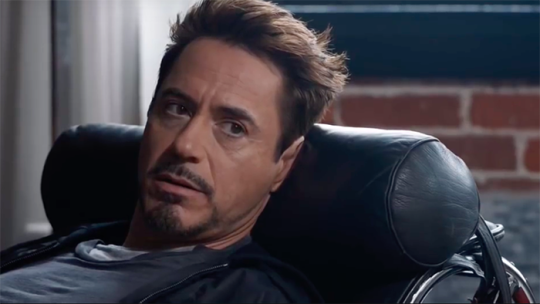
“We create our own demons. Who said that? What does that even mean? Doesn’t matter, I said it cause he said it. ...So why am I telling you this? Because I had just created demons, and I didn’t even know it.” —Tony Stark, Iron Man 3
Iron Man 3 shows us just how deeply responsible Tony feels for the wrongs of the world. Because he made naive (and selfish) mistakes when he was young, Tony blames himself for creating villains that plague the earth now.
We see this best in the aftermath of the destruction of Tony’s mansion in Malibu.
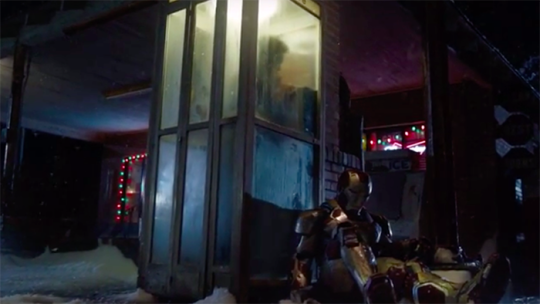
“Pepper, it’s me. I’ve got a lot of apologies to make and not a lot of time. So first off, I’m so sorry I put you in harm’s way. That was selfish and stupid and it won’t happen again. ...And I’m sorry in advance because I can’t come home yet. I need to find this guy. You got to stay safe. That’s all I know.” —Tony Stark, Iron Man 3
Yes, Tony absolutely provoked the Mandarin, a known terrorist, and the result is the complete annihilation of Tony’s home. Tony accepts responsibility for the destruction as though he was the one who shot the missiles himself. He goes so far as to volunteer himself for a solo mission to find the Mandarin without even bothering to contact SHIELD or the Avengers for help. He made this mess, he’s going to clean it up. All the while he suffers through crippling anxiety and panic attacks, demonstrating that the burden he’s put on his own shoulders is, in fact, too much for him to handle by himself. Still, Tony denies himself the comforts of home and family until he can atone for his wrongdoings.
Miraculously, Iron Man 3 gives Tony a respite when the tables are turned and, for once, Tony is the one ultimately saved by Pepper. After her rescue (pun intended), Tony gives up the armor, commits to having the shrapnel taken out of his chest, and he starts rebuilding the literal ruins of his life—both physical and metaphorical.
The respite doesn’t last, of course, because recovery doesn’t go in a straight line—oh, and also the franchise isn’t over and the MCU kinda needs Iron Man. And so Tony slides back into familiar, self-destructive patterns.

"Few years ago, I almost lost [Pepper], so I trashed all my suits. Then, we had to muck up Hydra. And then Ultron. My fault. And then, and then, and then. I never stopped. 'Cause the truth is, I don't wanna stop.” —Tony Stark, Civil War
Tony taking on the mantle of the Messianic Archetype once more in Endgame falls perfectly in line with his established need to compulsively and perpetually atone for his sins. As a perfectionist who needs to assuage his guilt for his ongoing (and perceived) failures, Tony simply can’t stop himself from offering up his life in penance. Statistically it was bound to catch up with him, and in Endgame it does.
And not only does Tony give his life in true Messianic fashion, we are “treated” to a hyper-realistic and painfully extended sequence where his life drains out of him as his loved ones gather to witness him gasping out his last breath. (Thanks for that, by the way, Marvel. I’ll put this scene with the dead baby bunnies my childhood cat used to bring home as gifts. How thoughtful.)

Maybe the reason for the intensity of Tony’s death scene is to make the audience believe his death is the Real Thing, not some comic-book-superhero-movie trickery that he’ll be back from in a few minutes’ time. Perhaps it’s the only way to ensure we commit to the emotional depth of the moment. Perhaps the filmmakers see it as an homage to RDJ’s acting talent and commitment to the role. Regardless of the rationale behind the camera’s unflinching gaze, Tony’s excruciating death hammers home the brutal and lonely reality of the Messianic Archetype: it’s cruel to put the fate of the world on one person’s shoulders.
But Tony embraces that end. He throws himself into the machinery of fate, convinced he’s the cog that will make it all work.
And he does make it work.
So why is that a problem?
+
.
The Team-Oriented Universe
The problem with Tony doubling (tripling? quadrupling?) down on the Messianic Archetype at the apex of the franchise is that the MCU is an ensemble, team-oriented universe.

“You think you're the only superhero in the world? Mr. Stark, you've become part of a bigger universe, you just don't know it yet." —Nick Fury, Iron Man
Fury tells us from the get-go that Tony isn’t the be-all-end-all of the MCU. It’s possible for Tony—for them all—to become something greater than the sum of their parts.
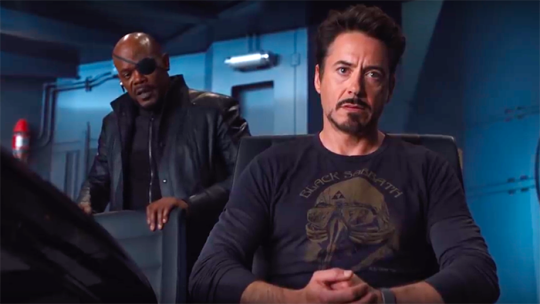
“There was an idea, Stark knows this, called the Avengers Initiative. The idea was to bring together a group of remarkable people, see if they could become something more.” —Nick Fury, Avengers
The entire first Avengers movie is dedicated to establishing this premise, to getting these knuckleheads to work together because, alone, they’re too wrapped up in their own bullshit to adequately deal with the forces that threaten the planet. Things don’t start to go right for them until they set aside their personal issues and act as a unit.
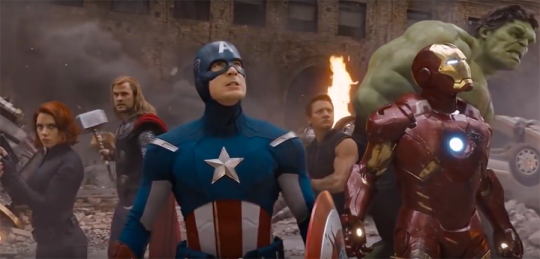
As we all know, our team passes the test and they establish an important principle of the MCU: teamwork is powerful and it’s more effective than working solo.
True, Tony’s self-sacrifice in the context of the Battle of New York helps save the day; but it’s only one part of a coordinated effort. Tony chucking the nuke into space would have been pointless without the added efforts of Steve to coordinate civilian safety, Hawkeye to relay enemy movements, Thor to separate Loki from the scepter, Natasha to close the portal, and Hulk to subdue Loki and ultimately catch Tony as he fell from the wormhole. The team achieved a better outcome together than they each could have achieved separately.
But even in the shared afterglow of winning the Battle of New York, the individual members of the team struggle to perfect their dynamic. New challenges present themselves. There’s always room for the team to grow and become stronger together as the franchise progresses. That’s the whole point.
Tony, for his part, waffles back and forth between his desire to be the savior mechanic (to fix everything by himself) and his desire to work cooperatively with his found-family of superheroes for the common good. This internal conflict plays out over the course of the franchise as Tony takes on the Mandarin by himself in Iron Man 3. The issue then escalates in Age of Ultron when Tony convinces Bruce to help him create Ultron, unbeknownst to the rest of the team. Murder-bot problems and team drama ensue. Tony’s cycle of guilt perpetuates itself in the wake of the disaster in Sokovia, which prompts Tony to adopt the Sokovia Accords. He submits himself and the team to UN governance in Civil War. More team drama ensues.
The logical progression of this escalating team conflict should have involved Tony confronting his deep-seated compulsion to destroy himself for the sake of others. This is exactly the problem Pepper keeps trying to point out to him—his Messianic tendencies have started to cause more problems than they solve.

“There is nothing except this. ... There's the next mission, and nothing else.” —Tony Stark, Iron Man
Tony has struggled from the beginning to find the right balance between personal sacrifice and sharing team effort.
Pepper frequently tries to remind Tony that he doesn’t live alone in the world, he can’t do it all by himself. And there are people who want him to live.
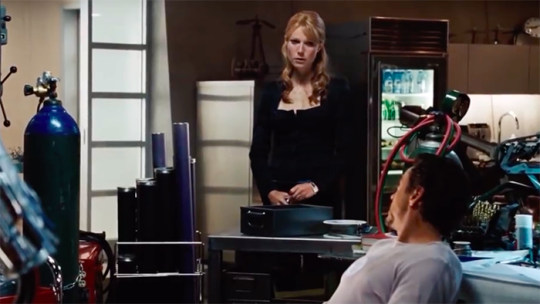
“You’re all I have, too, you know.” —Pepper Potts, Iron Man
Imagine how emotionally satisfying it would have been to see Tony outgrow his need for sacrificial penance and internalize a better lesson: that the savior can be saved, the burden can be shared, and life can go on.
+
.
A Better Ending for Tony
The MCU had the perfect opportunity to give us an ending that would be happier for Tony and a better fit for a team-centric universe.
In Guardians of the Galaxy we see Peter Quill and his team survive the power of an Infinity Stone by working together to share the burden of its energy.
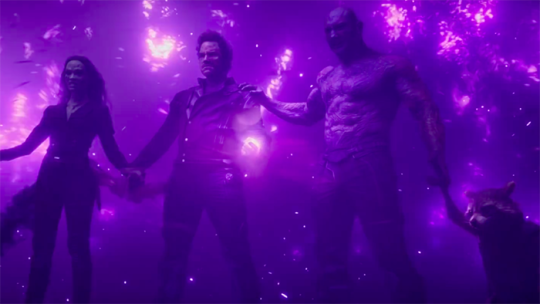
Peter Quill is the son of a Celestial—he’s basically immortal up until the end of Guardians of the Galaxy Volume 2. That’s why he and his team could hold the stone without any ill effects.
Also, they only had to channel the power of one stone. Not six.
That’s a fair point.
But by the time Tony had all of the Infinity Stones in Endgame, the battlefield was chock full of all kinds of superheroes. Wanda and Carol by themselves are embodiments of two of the Infinity Stones. Hulk had managed to bear all of the stones by himself earlier in the movie. Steve, T’challa, and Bucky are enhanced super soldiers. Thor, Valkyrie, and the other Asgardians might not be Celestials, but they are gods—and there were a lot of them on that field.
And we’re supposed to believe none of these characters could offer any help to Tony whatsoever? None of them could hold Tony’s hand for a single minute to save his life?
There are plenty of arguments that could be made: Tony was too fast, no one knew what was happening, or everyone else was occupied in battle. But at the end of the day, it’s a choice the creative team made. Tony died because they wanted him to die.
And not much would have to change to save his life.
Imagine this: Tony gets the stones from Thanos and, in true Messianic Archetype fashion, he commits to making the snap, fully expecting it means his death—but then Pepper is there and Pepper has always been the one asking Tony to stop offering up his life to pay for some imaginary debt he thinks he owes. He hesitates, and it’s just long enough for Carol and Wanda swoop in, putting their hands on him and taking the brunt of the energy. Thor and Steve and Bruce and Clint pile on. Peter Parker links up, too, and on and on until the entire rest of the team, all across the battlefield, are in contact with each other and alight with power, channeling the energy of the six stones, keeping Thanos and his monsters at bay.
Tony can still have his ultra-badass “I am Iron Man” moment as he stands at the center of this surging and fluxing cosmic energy—but this time he does it with support. There are people who care about him (and each other) on all sides. And there are so many of them. Tony isn’t the only one who matters, he’s just the lynch pin that holds it all together.
Tony is Iron Man.
More importantly? Together they’re all the Avengers.
*SNAP*
The universe is set right.
Maybe Tony doesn’t escape entirely unscathed. Maybe he loses his arm as suggested by this post. Maybe the others all leave with their own scars, too. But Tony’s alive and he’s finally, deeply aware of what it means to transcend the limits of personal sacrifice and share the hero’s burden with others.
He knows now exactly what the Avengers are capable of. Oh, and by the way? That protective shield he wanted around the world in Age of Ultron? Here they all are. All these wonderful, powerful people are going to protect the Earth. And you know what? They don’t need Tony Stark’s myopic self-sacrifice to do it.
Tony finally feels like he’s done enough—and maybe now he believes there are other heroes out there who can do better than he can. Anyway, he gets to go home to Morgan and Pepper and he finds that it’s not so hard for him to let the new kids do the tough jobs now. He happily goes back to his role as “consultant” for the Avengers, he’s a mad inventor helping change the world for the better, and he also gets to have the long adventure of being a husband and a dad. He doesn’t have to choose one identity over the other—he’s Iron Man. He can redefine what the job means whenever he wants to.
(Also, he finds a way to rescue Nat because she didn’t deserve to be fridged like that. Just saying.)
This ending, or any number of variations like it, would have allowed Tony to finally show real growth at the end of his character arc, instead of succumbing to the same old self-destructive pattern we've seen from him time and time again. And it would have reinforced the theme of teamwork and its power to elevate all those who participate.
Maybe it’s cheesy, but you know what? It’s the ending I wanted. I know I’m not alone.
+
.
Tony’s Not Really Dead, You Say?

“There’s no need to be upset about Tony’s death,” some might say. “Tony’s gonna come back!”
Resurrection is a huge part of the Messianic Archetype—and it might be that the filmmakers do intend to bring Tony back in some later movie. It might be they simply want Tony’s death in Endgame to sit a little while longer so it has a greater impact. (Gotta push for that best picture Oscar, right? The Oscars hate superhero movies, but they do love a sad ending.)
While I’m wishing for things, maybe Marvel will also release the multiple alternate endings they filmed for Endgame, essentially creating a “choose your own adventure.” Maybe we’ll all be able to pick the ending we like best and forget the rest exist.
But I can’t make a judgement based on what might be, I can only say how I feel based on what we were given in the theater—for all intents and purposes, that’s the official story Marvel wants to share.

The Endgame narrative insists there’s only one possible path to victory against Thanos. The “one possible path” is basically the equivalent of the creative team saying, “Don’t @ me.” There certainly must have been an impossible number of endings they could have put on film. Tony’s death is the one they picked.
So, sorry for @ing you, Marvel, I guess, but there’s just one more point I want to make...
+
.
A Personal Note
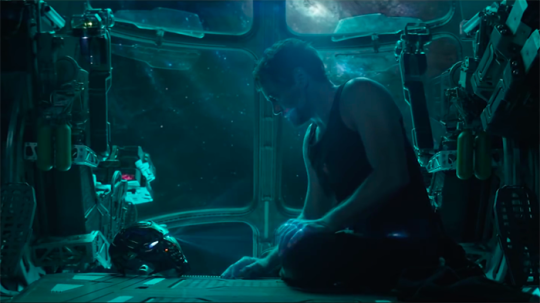
RDJ acted the hell out of Tony's final scene. He acted the hell out of the whole franchise. Tony's death was powerful and intensely moving. I wanted to ugly cry in the lobby after the movie was over, and I was upset for days after.
So. Good job, Marvel. You got in some surprises and you wrung out some feelings from viewers like me. Now that the movie’s taken the world by storm, the surprises will play themselves out. So, I guess the big question is: Will audiences want to revisit this adventure and the feelings you ultimately left them with?
For me? My reluctant answer is: no. I don’t want to see Infinity War or Endgame again. Not really. Not in their entirety. I didn’t mind the slog through Infinity War in 2018 because I thought, Hey, maybe this is leading to an ultimately happy and satisfying conclusion for these characters I care about so much. And, to be fair—right up until the last 15 minutes of Endgame, I was ready to say, “All’s forgiven.”
There’s this thing in storytelling called “payoff.” It’s when you deliver a satisfying resolution or fulfillment to your audience after they commit to your narrative journey. Payoff can be extraordinarily subjective, so, again, I acknowledge that there’s no way to please everyone.
For me, there’s no reward in the resolution of Endgame that makes the slog to its conclusion worth it. Tony’s ending is so needlessly sacrificial, so unnecessarily brutal, that it erases much of the enjoyment I otherwise had in watching the entire rest of the film.
Don’t get me wrong. I like sad movies and scary movies in their own context. I like them when I can choose them and know that’s what I'm getting myself into. Sometimes I want the catharsis of being utterly terrified or brought to tears. Sometimes we need stories to give us the chance to feel deep and scary emotions in a safe environment. That’s an important function of creative work.
And, I mean, truly, Endgame gave us some great acting, great effects. Amazing talent. Really fun and creative moments. I’m not trying to disparage all the work that went into its making.
But I feel like someone took me in a limo to a high-class restaurant to eat caviar and watch sad arthouse theater when all I really wanted was to go into town with my friends for some ice cream and a fun movie.
I didn’t need rainbow-colored sprinkles on my ending, but something a bit sweeter would have been nice.
So, well done, Marvel. But also—no, thank you.
As it stands, Endgame was too bitter for my taste.
68 notes
·
View notes